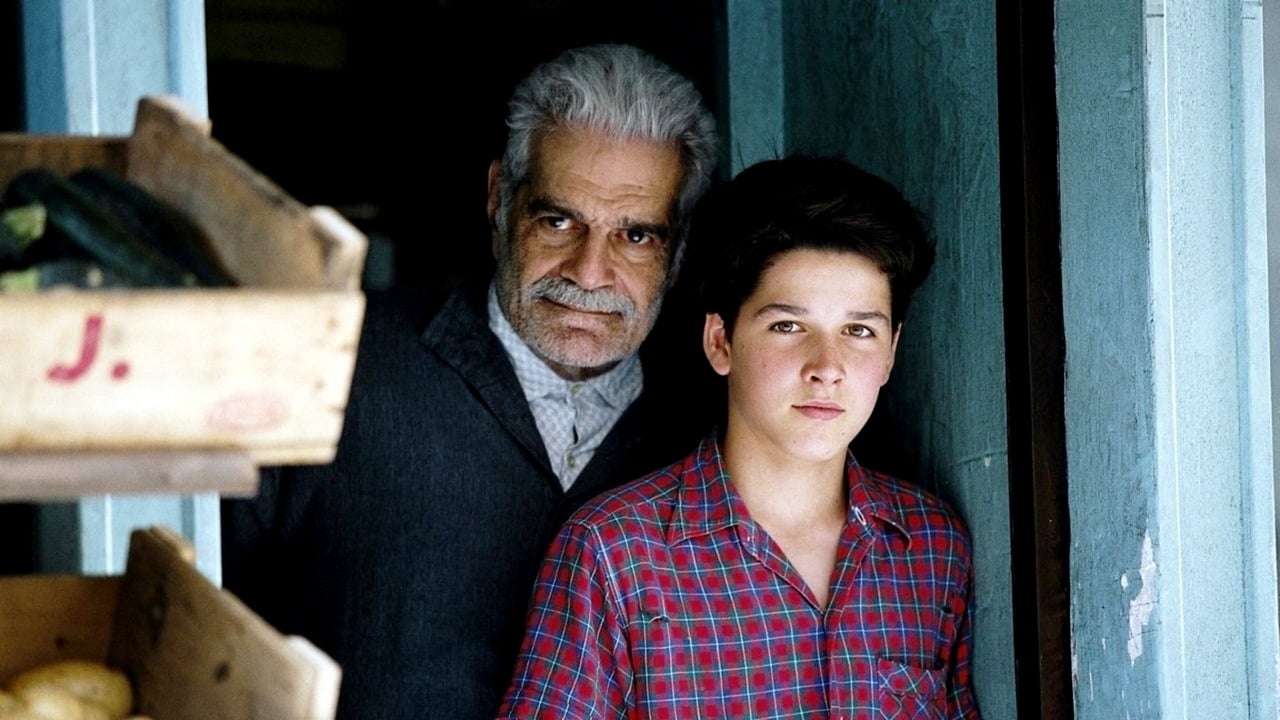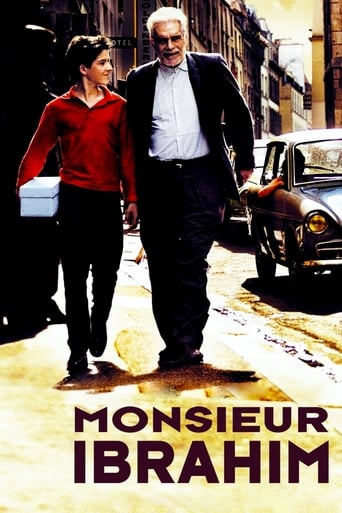

Surprisingly incoherent and boring
... View MoreLoad of rubbish!!
... View MoreIt's one of the most original films you'll likely see all year, which, depending on your threshold for certifiably crazy storylines, could be a rewarding experience or one that frustrates you.
... View MoreOk... Let's be honest. It cannot be the best movie but is quite enjoyable. The movie has the potential to develop a great plot for future movies
... View MoreThe person who wrote that this is a fairy tale was right.An older man helps an adolescent come of age.This is basically a beautifully crafted movie. I think the story would have worked better if Moises had been a shyer introverted kid instead of a semi street smart hooker-hiring Ferris Bueler's day off type making dance moves. This film is obviously a fairy tale primarily aimed at 50 something men who might have been about 14 in 1960 creating a nostalgic fantasy for them. Why are the French so into that? I lived in French North Africa during the first half of the 1960s...and I was 8 to 14 at the time....I identified with the vintage cars a lot more than with the not too smart would be hood who was the hero.One script flaw...Albania was a rigid closed Maoist society in those days...they could not possibly have driven through it on the way to Turkey.Still I enjoyed the movie despite having my jaw semi clenched through a lot of it--I generally hate coming of age movies--personal thing. Everyone wishes they had a mentor like Shariff. However his litany of little clichés of wisdom reminded me of ones you see in B grade oriental movies. They were only bearable because Shariff is a great actor in the hands of anyone else they would have been a lightening rod for ire. "You lose everything you keep" "If you want to know something talk to someone don't read a book". Yawn...Yes go ahead and rent the movie overlook the pearls of wisdom by looking at Shariffs face or tweak them a little.... there are so many worse films out there.
... View MoreThe message here transcends the medium. The "inner religion" here, it seems to me, is Love, straight from the heart. There's so much wisdom imparted here, old man to young, that I couldn't help but take notes. "What you give is yours for good," Sharif tells the boy: "What you keep is lost forever." "You can't understand everything with your mind," he points out. The trip to see the whirling dervishes is (for someone like myself, who has no religion) an amazing thing to see. "They lose all their bearings," Sharif says: "That burden we call balance." "All rivers flow into the same sea," he concludes. Simple, yet profound- that's MONSIEUR IBRAHIM ET LES FLEURS DU CORAN. And that, as the old man says, is "all there is to know."
... View MoreIn reading some of the comments here, I wondered if I had seen the same movie.We are being told a story that consists entirely of Momo's memories, impressions and, possibly, fantasies of when he was growing up.So it seems strange that, for example, some reviewers complain here that there is not enough formal comparative religion or, God/Allah/Yahweh help us, that the film is antisemitic.I also wondered why no-one (apparently) mentioned what Momo found inside M. Ibrahim's Koran (which surprised and intrigued me) and what that might mean.The message boards didn't help much -- and there was more ranting about more or less nothing and "facts" that seems unlikely, to say the least.Then I found the author's site and things started to make a lot more sense.Eric-Emmanuel Schmitt tells us that Momo and Monsieur Ibrahim are two people who pass unnoticed through the world. Momo is an only child with no mother, and a father who barely deserves the name of 'father', too sunk in depression to take care of his son and bring him up, or teach him and hand on to him a taste for life and its principles. As for Monsieur Ibrahim, the only thing anyone asks of him is that he give them the correct change. Both man and boy change their lives as they get to know one another. Their encounter is a marvelous enrichment.The author notes that there has been a lot of verbiage about the fact that the child is Jewish and the grocer Muslim -- "Rightly so. It was a deliberate move to create them like that. I set out to prove something and be provocative. What I wanted to prove was that in many places in the world (European capitals, ports, American cities, North African villages), people of different religions from different backgrounds live together in harmony. In Paris, Rue Bleue, the road where this story takes place and where I once lived and which definitely isn't blue, was largely inhabited by Jews with a few Christians and Muslims. They all shared not only the same street, but daily life, their joys, discontents and conversation. Friendships or mutual understanding developed among these people who came from just about everywhere, either geographically or spiritually. In this unpretentious quartier down from Montmartre, I felt I was living somewhere rich and burgeoning, where cultures met, took an interest in each other and joked about their differences."Also, when Momo is handed Monsieur Ibrahim's old Koran, he finds what was in it -- dried blue flowers. The Koran is the text but it is also what Monsieur Ibrahim has placed in it -- his life, his way of reading, his interpretation. According to the author, "spirituality is not about repeating sentences parrot-fashion, but about grasping the meaning and understanding the concept and shades of meaning, the implications. True spirituality is only worthwhile when obedience and freedom are balanced".There is a quite a bit more that you may find useful and interesting - search "Eric-Emmanuel Schmitt" if you want to explore further.
... View MoreThis simple type of "buddy" film story has been seen too many times before to be totally new and different to me, thus it did not grab and hold my interest and heart the same way it might have done for a young person seeing the story for the first time. And, as shown in the film, there is always a "first time".That being said, the film was pleasant enough if not overly impressive, as it was mostly a gentle little story about a lonely, older Muslim storekeeper, with a vast storehouse of wisdom and life experiences, befriending an essentially orphaned 16 year old Jewish(more or less incidentally) boy in 1960 Paris, and the small slices of daily life in the teeming semi-ghetto they shared as the old man's wisdom and life's experience was gradually transferred to the next generation, as it always must be done. As the old man himself said, "if you want to learn something, don't read a book...talk to someone". Shoplifting, hooker sex, a suicide, failed first love, an adoption, a buddy road trip, and the end...there you have it. Not a lot of weight here, but enjoyable enough. And, it must be for most as this story is filmed again and again through the years and this one was nearly as good as any. The story worked well enough for me until the final buddy road trip, where it all ended a bit too abruptly for my taste. Too much had been shared to end it all so quickly. Seeing an older man/young boy story like this one unfolding, I might suspect an underlying pedophilia reason for the man's intense interest in the boy. What a pleasure to see that not develop here, knowing all too well the weird and sick story development of many of today's films that is often so disgusting to mature viewers.Many thanks to the filmmaker for not taking that edgy "modern" track, and for keeping the film's overall sense of sweetness and loving paternalism intact to the end.
... View More